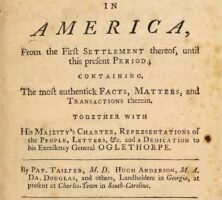Among those to voice displeasure with the policies of General James Oglethorpe and the Georgia Trustees during the early years of Georgia’s settlement, the Malcontents issued the most vehement complaints. The leaders of the group, composed primarily of Scottish settlers near Savannah, included Patrick Tailfer and Thomas Stephens. The Malcontents first made their objections heard in 1735 shortly after their arrival in the new colony.

From A True and Historical Narrative of the Colony of Georgia in America, by P. Tailfer
Whereas many of Georgia’s original settlers came with monetary aid from the Trustees, most of the Malcontents arrived without assistance and thus did not have the same loyalty to the colony’s founders. In particular, the Malcontents objected to the Trustees’ limits on landownership and prohibitions on slavery and rum. Since the Malcontents could afford to purchase enslaved Africans and vast tracts of land, they felt the policies of the Trustees prevented them from realizing their economic potential.
Between 1737 and 1738 Patrick Tailfer organized a group of colonists who objected to the actions of the Trustees. One of their first public complaints came in 1738, when the group wrote and circulated a petition that called for drastic changes in the colony’s administration. Although 121 residents signed the petition, the Trustees refused to amend the laws. Frustrated by the lack of local authority or change in Georgia and its administration, many of the Malcontents’ leaders left the colony in 1740. Representatives of the Trustees believed internal dissent would decline with the Malcontents’ departure.
In 1740 William Stephens, the father of Thomas Stephens and secretary to the Trustees, wrote a memorial entitled A State of the Province of Georgia. The document claimed the Trustees and their policies enjoyed wide support throughout Georgia and—owing to the unique laws governing the colony—economic success seemed assured. For many residents Stephens’s description did not reflect reality. Speaking for the Malcontents, Tailfer refuted Stephens’s claims in a tract entitled A True and Historical Narrative of the Colony of Georgia. Writing from Charleston, South Carolina, Tailfer reiterated his belief that Georgia’s survival required significant changes. Tailfer wanted members of Parliament and others who provided funding for Georgia to understand that many of its residents were prevented from succeeding financially because of the Trustees’ policies.
Tailfer’s arguments were heard but did not result in immediate change. Officials in London ordered additional surveys of popular sentiment following the publication of Tailfer’s pamphlet, but the Trustees and their increasingly controversial statutes remained. In 1742 Thomas Stephens, representing the Malcontents and other disaffected settlers from London, published a pamphlet entitled The Hard Case of the Distressed People of Georgia. The Trustees maintained their power, but Stephens’s arguments continued to be heard in Georgia and England. When the Trustees passed a law in 1750 allowing slavery, many credited the change to the actions and writings of the Malcontents.






